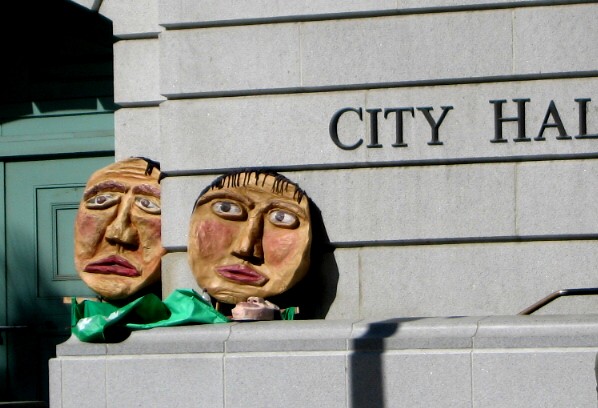by Leslie Radford
Wednesday, Feb. 22, 2006 at 4:02 AM
leslie@radiojustice.net
and tell the Mayor and City Council, "Thanks, but no thanks" to private buyers

faces_at_city_hall.jpguuttfd.jpg, image/jpeg, 598x408
LOS ANGELES, February 17--At 10:00 a.m. in a jammed Los Angeles City Council chambers, two dozen South Central Farmers and a hundred farm supporters in bright green shirts crowded in the back three rows and behind the pews. Small green ribbons and green armbands decorated supporters throughout the audience. The farmers waited with years-long-learned patience through interminable retirement tributes, recognition of Filipino war veterans, and the beginning of a resolution for the residents of Lincoln Place. Their supporters were somewhat more restless.
In front of City Hall, another thirty farm supporters stretched banners along the bulwarks and marched along the sidewalks with cardboard fruits and vegetables, and signs demanding the land be returned to the farmers.
But it was undoubtedly the implacable demeanor of the farmers themselves that prompted council president Garcetti to urge a speedy start for their benefit.
For months, a small contingent of farmers has come weekly from tilling, planting, and harvesting the earth to the architectural grandeur of the John Ferraro Council Chamber to plead for their land. Unlike their prior presentations, today the City Council sat up and took note.^p The farmers worked City Hall like the pros they've become. At 11:30, leaving a small group waiting to speak, a sea of green silently left the chamber and swelled around the third floor corner to the Mayor's office. On being told that Mayor Villaraigosa wasn't in, they made sure their presence, as one aide affirmed, "was noted."
A bystander was escorted from the council chambers when he predicted a workers' uprising if the farm is demolished.
Then the mass of farmers and supporters briefly returned to council chambers before moving on, again with a group remaining, to a well-coordinated press conference on City Hall's south lawn. There, they made their demands clear:
That the farmers refused the Mayor's recommendation that they find private donations to buy the 14-acre property from developer Ralph Horowitz at market price, when the City had been sold it to him for only $5M. Instead they demanded that the City invoke eminent domain to reclaim the property and turn it over to the farmers.
That the Mayor hold a city-wide town hall meeting to explain how the transfer to Horowitz happened and to put forward a comprehensive plan for the greening of LA That the Mayor intervene to halt intensified ticketing of cars parked adjacent to the farm
Meanwhile, in council chambers, by noon the farm supporters finally had their say. Groups as diverse as Food Not Bombs and USC School of Policy, Planning, and Development students stood up for the farmers. One mother testified that she had fed her young children from the food on the farm and, because of that, avoided welfare until she got on her feet. Another speaker pointed to the City's potential embarrassment if the South Central Farm is shut down as the American Community Gardening Association plans its August conference for Los Angeles. A high school science teacher berated the council for racism and classism in their treatment of the farmers, declared that shutting down the farm would be the first shot in a race and class war, and asked, "Do you expect these families to docilely take their children to McDonald's and watch television" if the farm is shut down.
As the speaking group left the chambers to join their sisters and brothers on the lawn, the farm supporters put the Council on notice with a chant that "Hey, hey, ho, ho, these backroom deals have got to go!" Police urged them on their way out.
The farmers left quickly after the press conference, presumably back to waiting employers after a half day's absence. But a small group of supporters remained, singing and dancing on the lawn.
In spite of my years of education, I remain monolingual. If I spoke Spanish, I would have asked the farmers if any of them had learned their quiet resolve in Mexico trying to save their land after NAFTA. It was two months ago that the farmers announced the imminent demolition of the farm. Today, the farm is still here, and Los Angeles City Council took note.

